
Related
Guests
- Norman Finkelsteinauthor and scholar. His new book, titled Gaza: An Inquest into Its Martyrdom, has just been published. He is the author of many other books, including The Holocaust Industry: Reflections on the Exploitation of Human Suffering and Knowing Too Much: Why the American Jewish Romance with Israel Is Coming to an End.
Israel faces a possible International Criminal Court war crimes probe over its 2014 assault on Gaza, which killed more than 2,100 Palestinians, including over 500 children. For more, we speak with Norman Finkelstein, author of the new book “Gaza: An Inquest into Its Martyrdom.” He is the author of many other books, including “The Holocaust Industry: Reflections on the Exploitation of Human Suffering” and “Knowing Too Much: Why the American Jewish Romance with Israel Is Coming to an End.”
More from this Interview
- Part 1: As ICC Considers Probing Israel for War Crimes, U.S. Moves to Defund U.N. Palestine Refugee Agency
- Part 2: Finkelstein: Despite Racist Policies & Corruption Scandals, Netanyahu Holds on to Power in Israel
- Part 3: Norman Finkelstein Slams Chuck Schumer for Pushing Trump to Declare Jerusalem Israel’s Capital
- Part 4: “Gaza: An Inquest into Its Martyrdom”: Norman Finkelstein on the Many Lies Perpetuated About Gaza
- Part 5: Norman Finkelstein: The “Big Lie” About Gaza is That the Palestinians Have Been the Aggressors
Transcript
AMY GOODMAN: Our guest today, author and scholar Norman Finkelstein, author of the new book Gaza: An Inquest into Its Martyrdom, the book published as Israel is facing a possible International Criminal Court war crimes probe over its 2014 assault on Gaza, which killed more than 2,100 Palestinians, including over 500 children. I want to turn to Israeli Prime Minister Benjamin Netanyahu talking about the 2014 military offensive in Gaza. He was speaking to Brian Williams of NBC News.
PRIME MINISTER BENJAMIN NETANYAHU: You know, at a certain point, you say, “What choice have you got? What would you do?” What would you do if American cities, where you’re sitting now, Brian, would be rocketed, would absorb hundreds of rockets? You know? You know what would—you’d say? You’d say to your leader, “A man’s got to do what a man’s got to do.” And you’d say, “A country’s got to do what a country’s got to do.” We have to defend ourselves. We try to do it with the minimum amount of force or with targeting civil—military targets as best as we can. But we’ll act to defend ourselves. No country can live like this.
AMY GOODMAN: That was Israeli Prime Minister Benjamin Netanyahu justifying the 2014 military offensive in Gaza, that the International Criminal Court is apparently about to open up a war crimes investigation into.
NORMAN FINKELSTEIN: Well, Benjamin Netanyahu says two things: Number one, Israel had no option, and, number two, that it used the minimum amount of force. Well, let’s look quickly at those two points.
Point number one, everybody agreed that the reason they went—once the fighting began, Hamas had one goal. The goal was to end the siege of Gaza, to lift the siege. Under international law, that siege is illegal. It constitutes collective punishment, which is illegal under international law. The siege has been condemned by everybody in the international community. He had an option. He didn’t have to use force. He simply had to lift the siege. And then there wouldn’t have been a conflict with Gaza.
Number two, he claims he used minimum force. There’s a lot to say about that. You can decide for yourself whether it’s minimum force when Israel leveled 18,000 homes. How many Israeli homes were leveled? One. Israel killed 550 children. How many Israeli children were killed? One. Now, you might say, “Well, that’s because Israel has a sophisticated civil defense system, or Israel has Iron Dome.” I won’t go into that; I don’t have time now. But there’s a simple test. The test is: What did the Israeli combatants themselves see? What did they themselves say?
We have the documentation, a report put out by the Israeli ex-service—ex-combatant organization, Breaking the Silence. It’s about 110 pages. You couldn’t believe it. You know, I’ll tell you, Amy, I still remember when I was reading it. I was in Turkey. I was going to a book festival. I was sitting in the back of a car and reading these descriptions of what the soldiers did. My skin was crawling. I was like shaking. Soldier after soldier after soldier. Now, bear in mind, you want to say they’re partisan, the soldiers? Read the testimonies. They’re not contrite. They’re not remorseful. They’re just describing what happened. There’s no contrition. These aren’t lefties, supporters of BDS. What do they describe? One after another after another says, “Our orders were shoot to kill anything that moves and anything that doesn’t move.” One after another after another says, “Israel used insane amounts of firepower in Gaza. Israel used lunatic amounts of firepower in Gaza.”
AMY GOODMAN: These were the Israeli soldiers.
NORMAN FINKELSTEIN: The soldiers, they’re describing it. One after another says, “We blew up, destroyed, systematically, methodically razed every house in sight.” What does that mean, “every house in sight”? Seventy percent of the people in Gaza, they’re refugees. It means they lost their homeland. The last thing they have, the only thing they have, the only thing they’ve ever had, is their home. And the Israelis went in like a wrecking crew with their D9 bulldozers.
AMY GOODMAN: Explain how it began.
NORMAN FINKELSTEIN: How what?
AMY GOODMAN: How the 2014 Israeli military invasion of Gaza began.
NORMAN FINKELSTEIN: No, these are hard things to explain, because it depends on where you want to start. Where I start is, at the end of April 2014, a national unity government was formed between the Palestinian Authority and Hamas. And the United States and the EU, surprisingly, they didn’t break off negotiations with this new unity government, although it “included a terrorist organization,” and it enraged Netanyahu.
AMY GOODMAN: You’re using air quotes. You’re saying what the U.S. called a terrorist organization.
NORMAN FINKELSTEIN: Well, what Israel calls a terrorist organization, because, at that time, the U.S. was willing to negotiate. And Netanyahu went into a rage, because he was being ignored over Iran, now he’s being ignored over Hamas. And so, he finds a pretext—I don’t want to go into the details now—he finds a pretext to try to provoke Hamas into reacting, so that he can say, “You see? They’re a terrorist organization.” And then it quickly spiraled downwards, as it typically does. And then Israel went in. There was the air assault.
And then, July 17th, the day the Malaysian airliner went down over the Ukraine, Netanyahu used that moment. The plane was downed in the afternoon, and he launches the ground invasion in the evening. You would be surprised how finely attuned the Israelis are to the American news cycle. They begin Operation Protective Edge in 2008 with Obama’s election to the presidency on November 4th. They begin the ground invasion of Gaza during—well, [ 2008 ] was Operation Cast Lead. They begin Cast Lead on November 4th, 2008, when Obama is elected president. They begin Operation Protective Edge, the ground invasion, on July 17th. When the airliner is downed over the Ukraine, all the cameras are now riveted over there, and so they launch the attack.
And the attack was—well, let me just quote to you Peter Maurer, who is the head of the International Committee of the Red Cross. And I was even surprised by his remark. Peter Maurer said—and I’m quoting him, paraphrasing him, but almost verbatim. He said, “In my entire professional life, I have never seen destruction as I saw in Gaza.” And that’s coming from the head of the International Committee of the Red Cross, who is accustomed to seeing, witnessing war zones. What was done there was—it was a crime against humanity. You take a place like Shejaiya. Shejaiya, it’s a very densely populated neighborhood of 90,000 people. Israel dropped, believe it or not—it’s hard to even fathom—more than 100 one-ton bombs on Shejaiya. More than 100 one-ton bombs on Shejaiya. Did the same thing to Rafah. Did the same thing to Khuza’a. Did the same thing to the whole Gaza Strip. And then you have this guy come along, and he said, “We used discriminate force. We used proportionate force.”
AMY GOODMAN: I wanted to go to after the—an attack on a U.N. shelter in 2014, the Israeli military attacking, in Gaza, which killed many Palestinian civilians. The spokesperson for UNRWA, the United Nations Relief and Works Agency for Palestine Refugees, broke down and cried during interview on Al Jazeera. His name is Christopher Gunness.
CHRISTOPHER GUNNESS: The rights of Palestinians, even their children, are wholesale denied, and it’s appalling.
AMY GOODMAN: Christopher Gunness is starting to cry.
CHRISTOPHER GUNNESS: [crying]
AMY GOODMAN: That’s Christopher Gunness, as the camera turns away from him, his head in his hands, later tweeting, “There are times when tears speak more eloquently than words. Mine pale into insignificance compared with Gaza’s.” Norman Finkelstein, we have two minutes left.
NORMAN FINKELSTEIN: I happen to know Chris Gunness. He’s a really terrific guy. I hope he doesn’t lose his job because I said that. But he is a special guy. He’s an unusual guy. He worked in Gaza. He’s married to a man, he’s married to a Jewish man, and he’s married to an Israeli man. So you can imagine that Hamas was not thrilled with him. But he’s very principled, and the tears were real. Anybody who lives there, has even passed through there, their heart breaks at what’s been done to the people of Gaza.
AMY GOODMAN: What do you think needs to be done now?
NORMAN FINKELSTEIN: Well, it’s clear the first thing that has to be done is the siege has to be lifted. And the U.N. Human Rights Council, although its report was a total and complete whitewash and disgrace—Mary McGowan Davis was the author of it—they did say, according to the law, the siege has to be lifted immediately and unconditionally. That’s the law: has to be lifted immediately and unconditionally. That’s the first thing that has to be done. The siege has to end. The occupation has to end. And the people of Gaza, after 50 godforsaken years, should have the right to breathe and live a normal life.
AMY GOODMAN: And how do you think that’s going to happen?
NORMAN FINKELSTEIN: It’s a very tough moment right now, but there are always possibilities. In my opinion, there is the possibility in Gaza of a nonviolent mass resistance, trying to force open the checkpoints and the West Bank. I don’t have time to go through it now. I think a mass strategy of smacking Israeli soldiers—women and girls—in the footsteps of Ahed Tamimi, that kind of strategy—
AMY GOODMAN: Who faces many years in prison right now.
NORMAN FINKELSTEIN: Yes. Nobody’s saying it’s without risks.
AMY GOODMAN: Ten seconds.
NORMAN FINKELSTEIN: But just as the children of Gaza, when they threw stones at the Israelis in 1988 during the First Intifada, shifted international public opinion, I think the people—the women of Gaza, if they have a “Me Too” campaign—”I smacked an Israeli soldier today”—I think that can win international public opinion also.
AMY GOODMAN: You talked about a nonviolent campaign—
NORMAN FINKELSTEIN: Yeah, I don’t consider—
AMY GOODMAN: —throughout the occupied areas.
NORMAN FINKELSTEIN: Look, I’m in the tradition of Gandhi. And Gandhi was very clear: When you’re facing huge odds against you and you use kinds of force like scratching, slapping, kicking—
AMY GOODMAN: Three seconds.
NORMAN FINKELSTEIN: —Gandhi said that’s not violence. And I agree with him.
AMY GOODMAN: Norman Finkelstein, author of Gaza: An Inquest into Its Martyrdom.

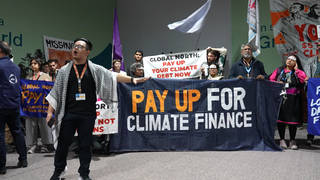
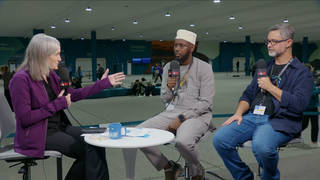
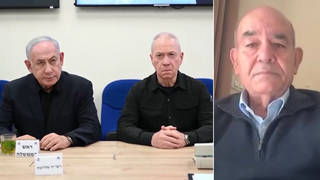
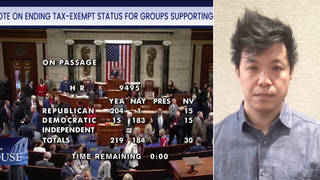





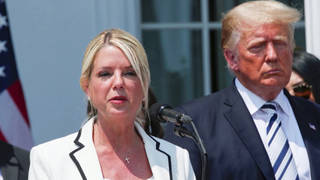
Media Options